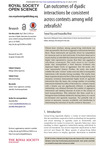Please use this identifier to cite or link to this item:
http://lib.hpu.edu.vn/handle/123456789/23676Full metadata record
| DC Field | Value | Language |
|---|---|---|
| dc.contributor.author | Roy, Tamal | en_US |
| dc.contributor.author | Bhat, Anuradha | en_US |
| dc.date.accessioned | 2016-10-11T05:37:50Z | |
| dc.date.available | 2016-10-11T05:37:50Z | |
| dc.date.issued | 2015 | en_US |
| dc.identifier.other | HPU4160594 | en_US |
| dc.identifier.uri | https://lib.hpu.edu.vn/handle/123456789/23676 | - |
| dc.description.abstract | Winner–loser relations among group-living individuals are often measured by the levels of aggressive interactions between them. These interactions are typically driven by competition for resources such as food and mates. It has been observed in recent studies on zebrafish that dominant males generally have higher total reproductive success than their less aggressive subordinate counterparts. This study aimed to test whether males who monopolized a food resource (winners) also displayed higher levels of aggression than the males who were unsuccessful (losers). | en_US |
| dc.format.extent | 8 p. | en_US |
| dc.format.mimetype | application/pdf | - |
| dc.language.iso | en | en_US |
| dc.subject | Biology | en_US |
| dc.subject | Behaviour | en_US |
| dc.subject | Ecology | en_US |
| dc.subject | Winner–loser | en_US |
| dc.subject | Aggression | en_US |
| dc.subject | Courtship | en_US |
| dc.subject | Zebrafish | en_US |
| dc.subject | Foodmonopolization | en_US |
| dc.title | Can outcomes of dyadic interactions be consistent across contexts among wil zebrafish? | en_US |
| dc.type | Article | en_US |
| dc.size | 489KB | en_US |
| dc.department | Education | en_US |
| Appears in Collections: | Education | |
Files in This Item:
| File | Description | Size | Format | |
|---|---|---|---|---|
| 0477_Canoutcomes.pdf Restricted Access | 489.43 kB | Adobe PDF |  View/Open Request a copy |
Items in DSpace are protected by copyright, with all rights reserved, unless otherwise indicated.
